- February 24, 2023
- By Karen Shih ’09
Name the biggest crises of the past 20 years, and it’s likely School of Public Health Dean Boris Lushniak was on the front lines. From the Ebola outbreak in Liberia to the Sept. 11 attacks, Hurricane Katrina and the H1N1 pandemic, he’s harnessed his expertise as a medical doctor and public health professional to save lives in the United States and beyond.
But when Russian tanks rolled into his ancestral homeland of Ukraine a year ago today, Lushniak felt helpless as he watched the coverage on CNN, tears rolling down his face. He called relatives there, offering to do anything possible to help get them out.
“They told me, ‘Boris, don’t you know us better? We are not going to be defeated.’ And that’s what we’ve seen this past year from the Ukrainian people,” he said. “Their motto is, ‘To victory,’ and that’s been true from the president down to the villagers.”
Lushniak’s family shares that resilience, emigrating to the United States in 1949 to escape the oppression of Soviet rule and putting him on the path to becoming a lifelong public servant. Though he trained to be a family doctor, a two-year fellowship opened his eyes to the possibility of making a bigger impact. He ended up spending 27 years in the Commissioned Corps of the U.S. Public Health Service.
“The idea of stamping out disease worldwide was really appealing to me,” he said. “I used my medical training not to treat individual patients, necessarily, but to treat populations.”
His work took him throughout the federal government, from the Centers for Disease Control and Prevention (CDC) to the Food and Drug Administration to the Office of the Surgeon General, where he served as deputy and acting surgeon general.
“I feel like I’m the luckiest person on the planet,” Lushniak said. “With all the public health crises I’ve experienced, there’s not a single one I wanted to miss.”
He just celebrated his sixth anniversary as dean, where he’s cultivating the same passion for public service within the SPH community. He took Maryland Today on a tour of his office, where he proudly displays his heritage, shares mementos of his missions and honors the public health heroes who came before him.
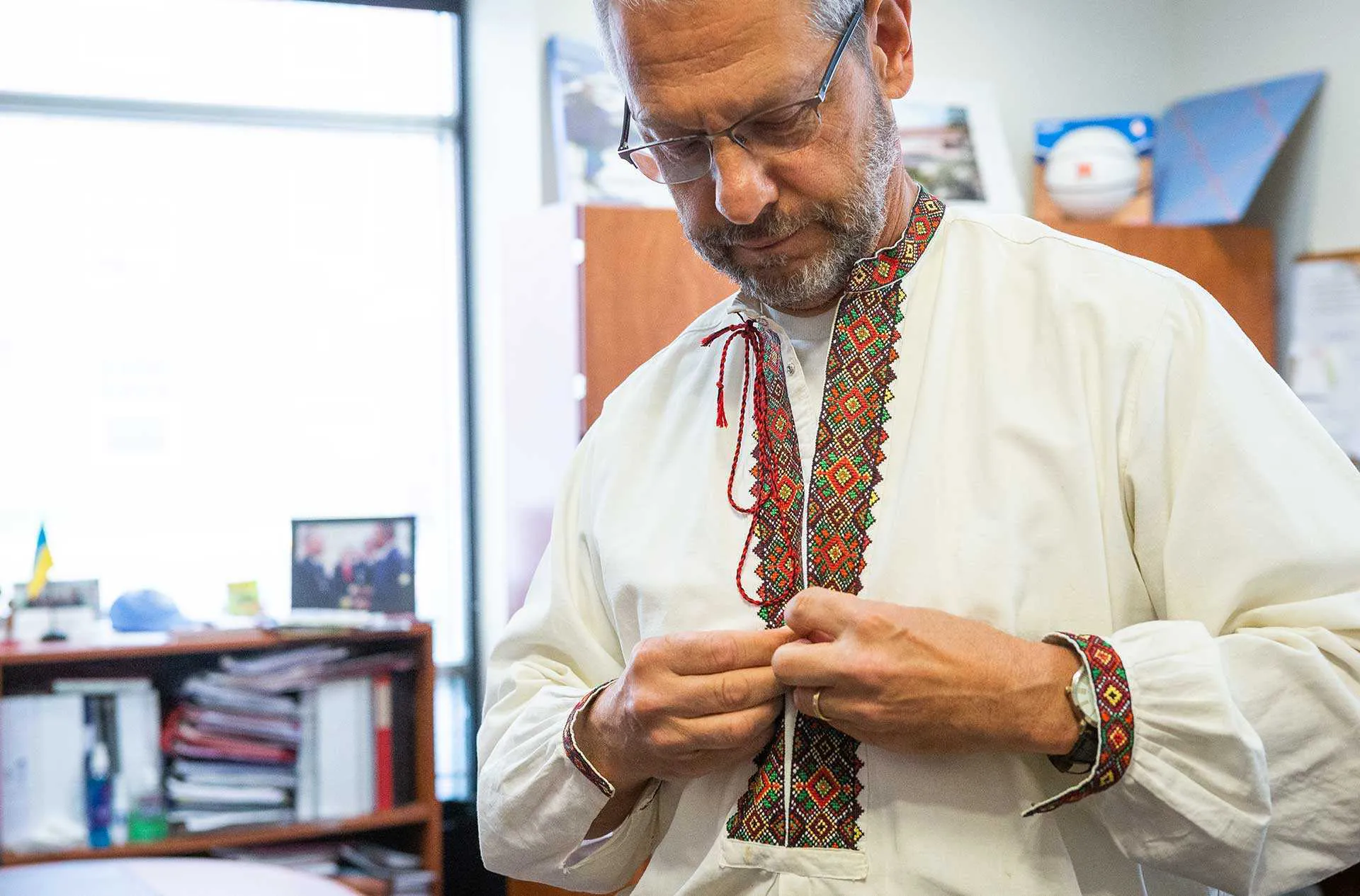
Embroidered Traditional Ukrainian Shirt
Just days after the full-scale invasion started last year, Lushniak wore the shirt to a Dean’s Forum meeting, where he shared the story of its origins.
“My mother made this from stolen bedsheets,” he said. His parents left Ukraine in the midst of World War II and ended up in a refugee camp in Germany for four years. There, she stitched traditional embroidery onto the sheets, and the shirt started its journey.
It traveled with his parents across the ocean as they landed in New Orleans, picked cotton in Mississippi, then settled in the Ukrainian Village neighborhood of Chicago. It wasn’t an everyday shirt; it was worn only for holidays, weddings, funerals—and protests.
“The sad thing, it’s protesting again. Just as it protested on my father’s skin in the 1970s against the Soviet Union, it’s protesting now for the same cause: an independent and free Ukraine,” Lushniak said. “That’s the real tragedy, how things haven’t really changed.”
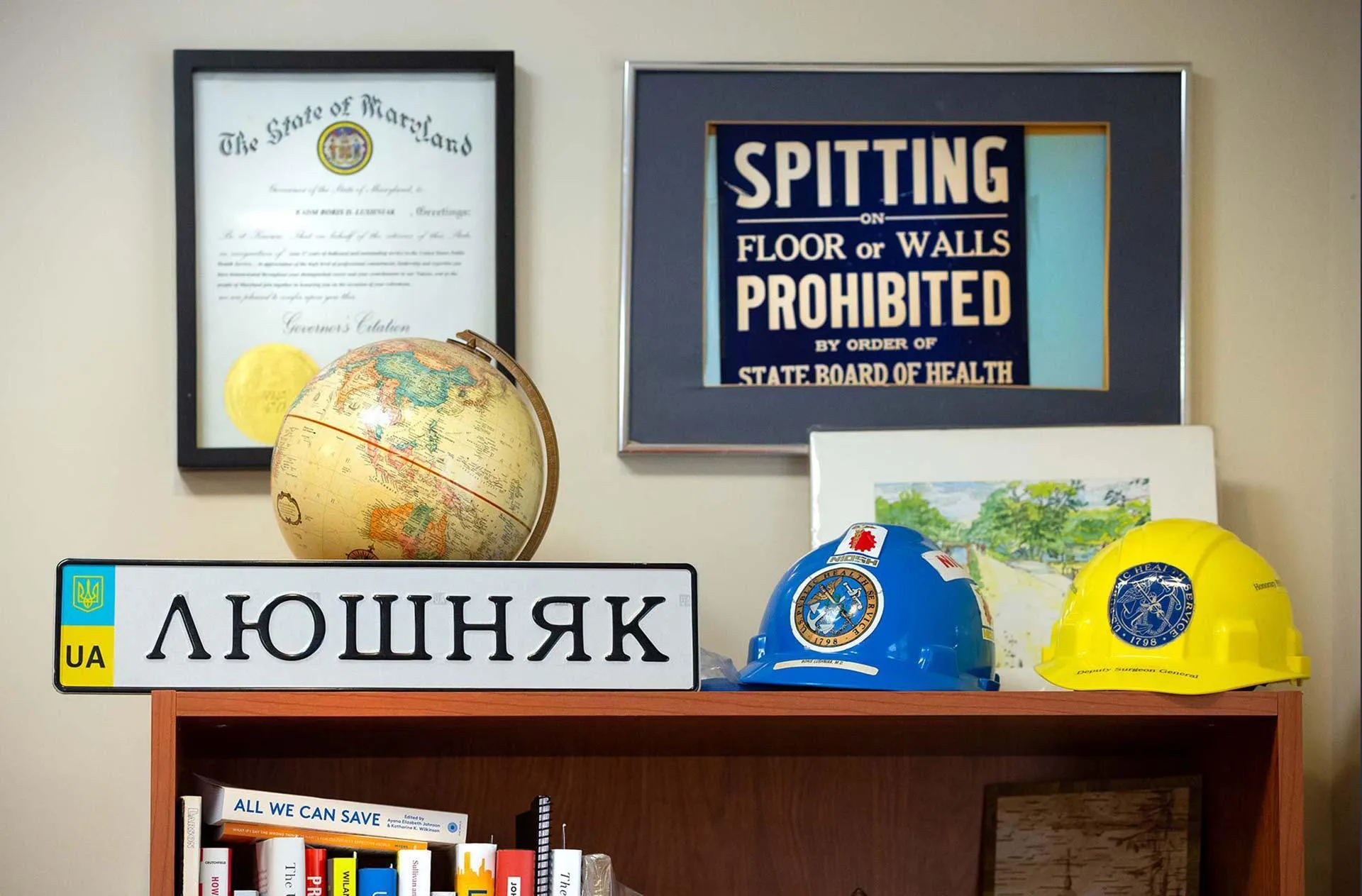
The “Lushniak” Name in on a European License Plate
A corner of his office is dedicated to memorabilia from Ukraine, including a license plate that displays his last name in Cyrillic. And every day, he wears a watch inscribed with the phrase “Slava Ukraini,” or “Glory to Ukraine,” the battle cry of its armed forces and a constant reminder of the ongoing fight.
Growing up, Lushniak spoke only Ukrainian at home, went to Ukrainian school every Saturday and spent three weeks each summer at Ukrainian scouts camp in the woods of Wisconsin, where campers saluted both the Ukrainian flag (forbidden in the Soviet Union) and the American flag each morning. His parents’ dream was to be ready to support their homeland—and possibly return—when it finally threw off the shackles of Soviet rule.
“After independence (in 1991), it was an unbelievable euphoria,” he said. He was finally able to take his parents back to their village to reconnect with family and friends they’d left behind. Lushniak continued his visits every few years, in both professional and personal capacity, making up for the decades of lost time. Now, unable to return, he can only wait and hope. “I want this to end in a positive manner for the people of Ukraine,” he said.
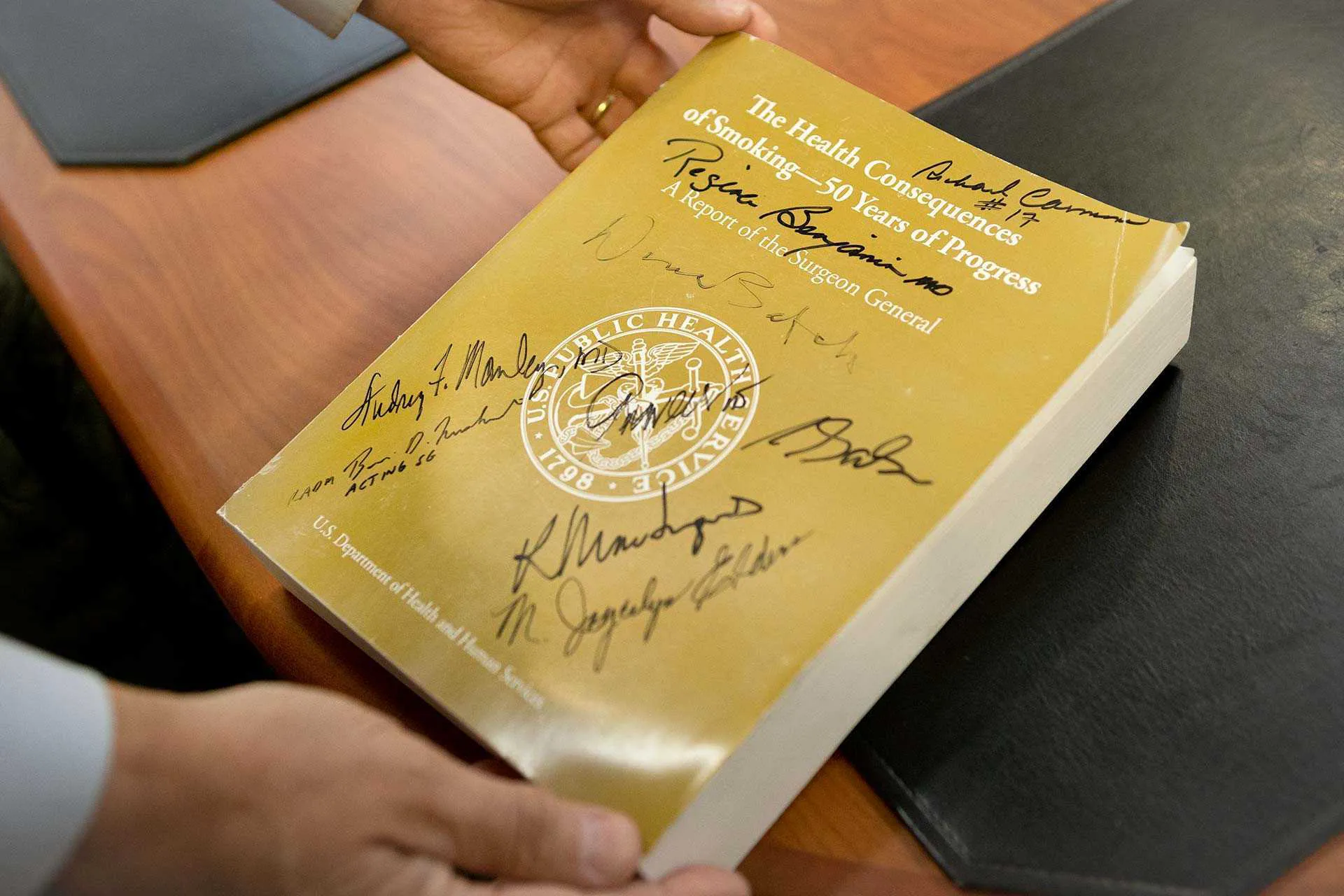
“The Health Consequences of Smoking—50 Years of Progress”
“Smoking remains the major cause of preventable death in this country,” said Lushniak, “but we’ve come a long way in 50 years.” As acting surgeon general in 2014, he led the release of the 50th anniversary report, showing five decades of progress, including decreasing the percentage of adults smoking in the U.S. from 42% to 18% in that time (the number has dropped even further since then, to 12% last year). At the release of the report at the White House, every living surgeon general who attended the event signed the cover for him. “It was one of those stellar moments.”
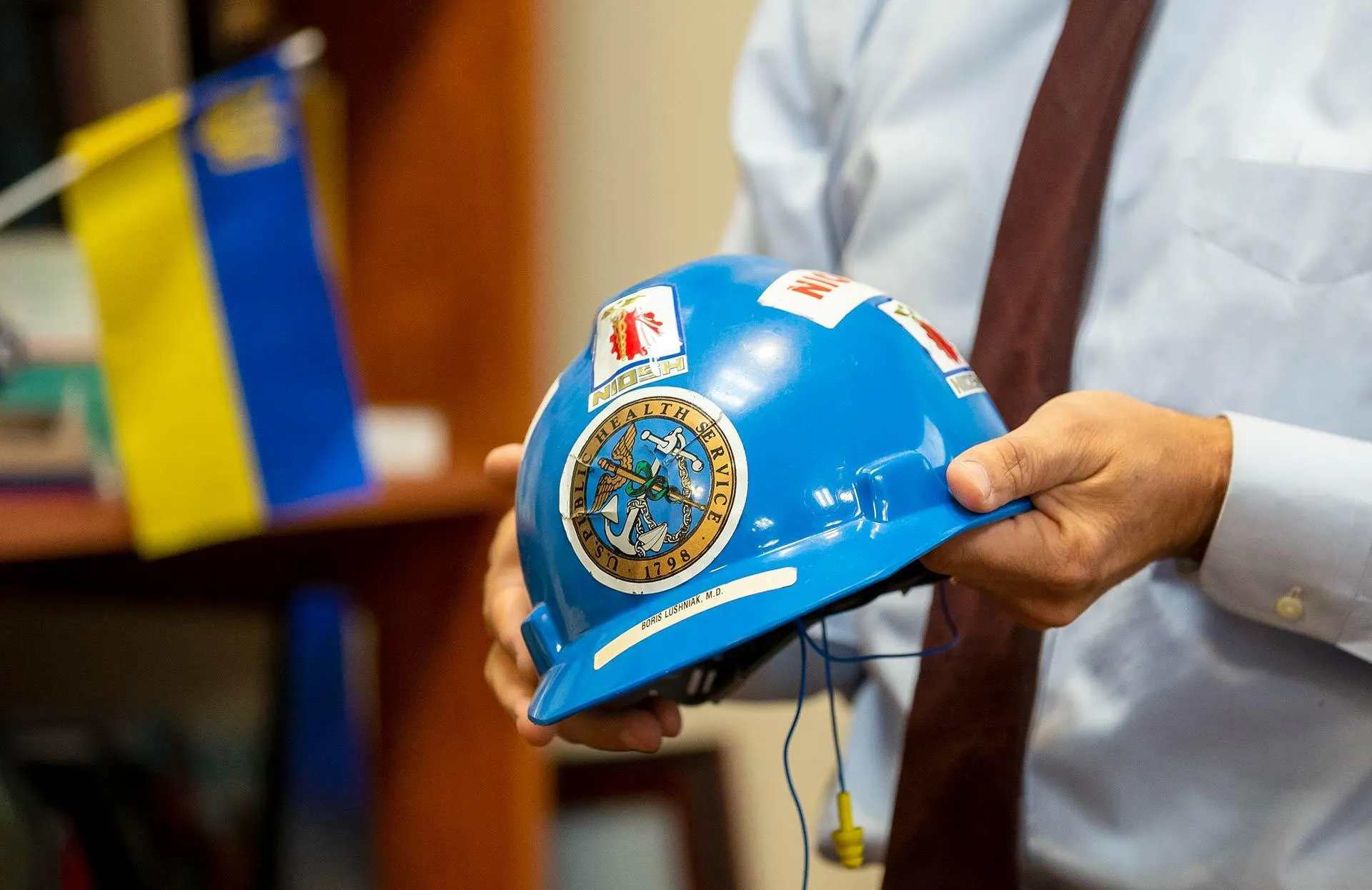
Helmet From Ground Zero
“This is the helmet I wore at the World Trade Center every day when we were at the pile at Ground Zero. It was a major, life-changing experience,” Lushniak said. He arrived four days after the Sept. 11 attacks as a member of the CDC’s National Institute for Occupational Safety and Health to evaluate and minimize risks to first responders. “We knew from our expertise there would be a lot of potential dangers to the rescue and recovery workers. Our angle was looking at exposures in the air, because it was a horrific site with a 10-story pile of burning chemicals and incredible destruction.”
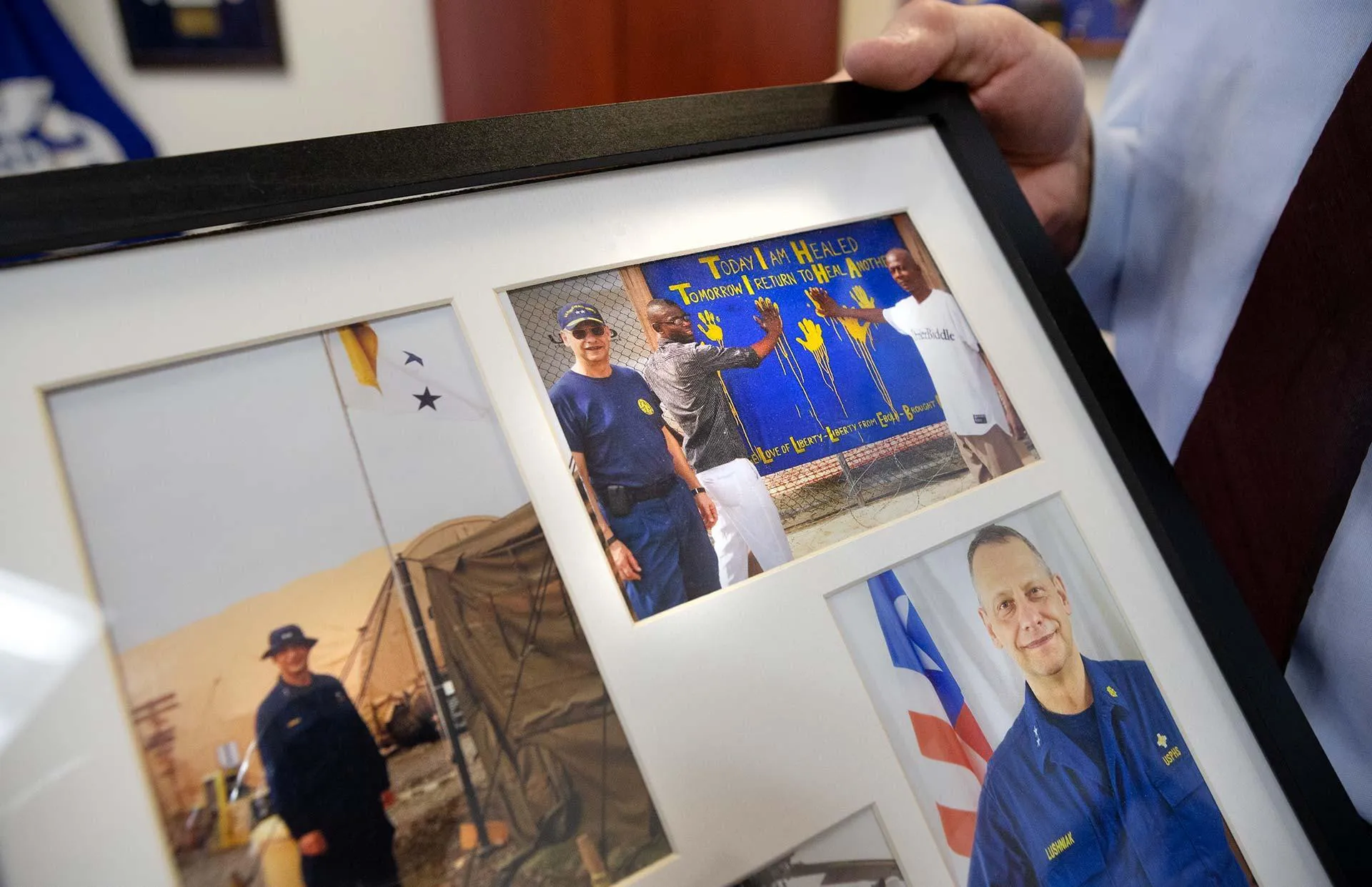
Ebola Mission Photos From Liberia
In 2015, Lushniak volunteered to lead a dangerous assignment in Liberia, serving as the mission commander for the U.S. Ebola response.
“It was terrifying because it was a very lethal disease that had no cure,” he said. He oversaw about 90 officers who ran a field hospital, living in tents and caring for Liberian health care workers who caught Ebola. His team was able to save about half of its patients—a remarkable number, given the 80% mortality rate of the disease.
While on the mission, he encountered servicemen from countries as far-flung as China and Germany, as well as aid workers from different organizations. “It was the beauty of a worldwide response, working together to stamp out a disease,” he said. He even came across a Ukrainian peacekeeping unit just a mile away, and got to know them during his three months on site. “Sometimes I think about those guys. Are they at war right now? I worry about who’s out there and how are things going for them,” Lushniak said.
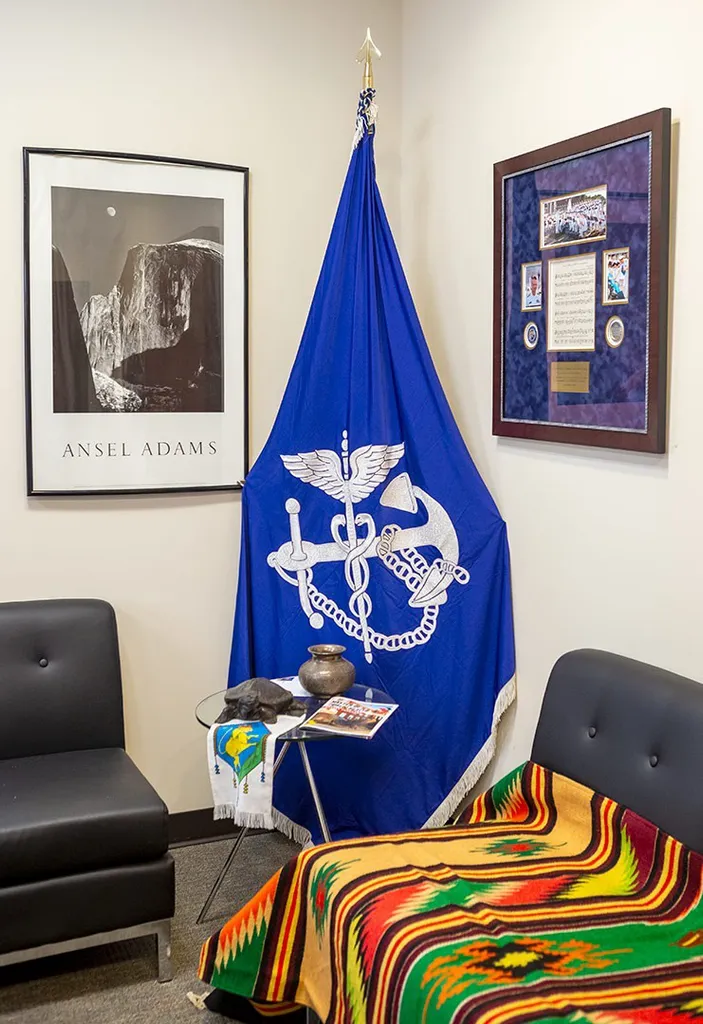
Surgeon General Luther Terry’s Flag
The blue Public Health Service flag once belonged to Luther Terry, the surgeon general who oversaw the original report on smoking and its health impacts, back in 1964. “Oddly enough, he himself, as surgeon general, was a smoker, but he gave it up after the report came out.”
Lushniak attended a ceremony to honor Terry, who died in 1985, on its 50th anniversary, and met the Terry family. Years later, they were going through Terry’s belongings and came across the flag; they asked if Lushniak would like to have it.
The blue flag with the white symbol of the Commissioned Corps represents the surgeon general (Lushniak has his own flag, with the colors inverted, denoting deputy surgeon general). “This stays with the School of Public Health,” he said of Terry’s flag.
This is part of an occasional series offering a look inside some of the most interesting faculty and staff offices around campus. Think you have a cool workspace—or know someone’s that you’d like to recommend? Email kshih@umd.edu.
Topics
Campus & CommunityUnits
School of Public Health